Interview with Emma Newman
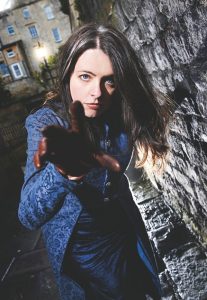 Emma Newman is the author of the science fiction Planetfall series, comprising Planetfall (2015), the Clarke Award-nominated After Atlas (2016) and Before Mars (2018), all out now with Gollancz in the UK and Ace/Roc in the US.
Emma Newman is the author of the science fiction Planetfall series, comprising Planetfall (2015), the Clarke Award-nominated After Atlas (2016) and Before Mars (2018), all out now with Gollancz in the UK and Ace/Roc in the US.
She is also the author of the urban fantasy Split Worlds novels, Between Two Thorns, By Any Other Name, All Is Fair (all 2013), A Little Knowledge (2016) and All Good Things (2017), and the steampunk novellas Brother’s Ruin and Weaver’s Lament (both 2017).
She hosts the podcast Tea and Jeopardy with her husband Peter Newman.
The Fantasy Hive was lucky enough to catch Emma Newman on the UK book launch for Before Mars, where she was kind enough to talk with us about her writing.
Your new novel Before Mars is out now with Gollancz in the UK and with Ace/Roc in the US. Can you tell us a bit about it?
It’s a psychological thriller, and it’s about a woman called Anna Kubrin, who is a geologist but she’s also an amateur painter. And her paintings have come to the attention of Stefan Gabor, who is a billionaire, owner of a corporation, and he sends her to Mars to paint pictures of Mars, whilst on Mars, using Martian materials, in the way that billionaires think this is a great idea. Because of the timings in terms of crew changeover she ends up having to go there alone, and arrives after spending six months or so, really quite disoriented because she’s been spending far too much time in mersives, which are fully immersive recorded memories. As she arrives, everything feels a bit odd, there are a few things that don’t quite add up. Then she finds a note in her room saying, “Don’t trust Anolfi,” who’s the psychiatrist. And it’s been painted by her. And it catapults her into a series of events that she doesn’t know whether she’s kind of stumbled into a corporate conspiracy or she is suffering from immersion psychosis. And so she’s kind of questioning herself and trying to find out more information about what happens.
All three of the Planetfall novels are particularly resonant for readers like myself who suffer from anxiety and depression because of how truthfully they portray that mindset. Which is really nice to see from a representation point of view, but what was it like digging into that to write them?
Awful. I mean, it’s not the kind of thing where you think, oh lovely! I’ll go and remember all those really awful panic attacks I’ve had over the years. I’m being flippant about it now. I’m actually really glad you said that, because that was one of the things that I really wanted to achieve. I’ve always loved science fiction. Science fiction has been my first love since I was nine. I stumbled across Trillions (1973) by Nicholas Fisk in the library. And I adored it and devoured it all the way through my teen years, but I was reading golden age sci fi, and much as I adore it, the representation is not so great. The concepts thrilled me and some of the characters were OK, but I was hungry for psychologically complex characters and a real examination of the intersection between the human experience and technology. And for a lot of my life, the human experience has been of anxiety and periods of depression. And I wanted to put real people into the imaginary worlds, and inevitably that meant drawing upon my own experiences.
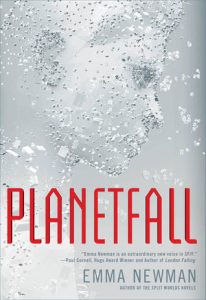 So with Planetfall, I don’t have exactly the same anxiety disorder as Ren does, but if there was a Venn diagram of our anxiety disorders there is definitely an overlap. And that overlap, I could draw upon my own experience to make some aspects of hers as authentic as I could write. And that was hard. There would be times when I would write a scene and I’d be shaking afterwards, like my body remembered, even though psychologically I was in a different state. With After Atlas I drew upon my anger and my rage. And that was a lot easier. I have a lot of anger all the time, I’m like the Hulk. I’m constantly raging about something or other, so that was really easy to tap into and almost cathartic.
So with Planetfall, I don’t have exactly the same anxiety disorder as Ren does, but if there was a Venn diagram of our anxiety disorders there is definitely an overlap. And that overlap, I could draw upon my own experience to make some aspects of hers as authentic as I could write. And that was hard. There would be times when I would write a scene and I’d be shaking afterwards, like my body remembered, even though psychologically I was in a different state. With After Atlas I drew upon my anger and my rage. And that was a lot easier. I have a lot of anger all the time, I’m like the Hulk. I’m constantly raging about something or other, so that was really easy to tap into and almost cathartic.
Whereas Before Mars, that was a completely different experience again. I really struggled, and I was convinced throughout the book that it was terrible, that it was awful. This is not news for authors, you pick any author out of a line up and they’ll say yeah, yesterday at 10:00 I was convinced my book was terrible. It’s what we all go through. But with Before Mars that just didn’t let up. I felt a massive physiological resistance to writing it, and I’ve had this really strange relationship with the book. I tapped into some very very very dark places, things that I hadn’t fully resolved myself, I realised. And my husband said, you know, you feel this way about the book because you’re tapping into some really dark terrible things. So that’s where these feelings are coming from, and I was like, no, it’s because it’s terrible! And I just wouldn’t face up to it. I did the first public reading of it on Monday last week, and I had this moment where I thought, oh shit, he was right. And you know, I’d read various drafts, I’d edited it, I had gone through the copy edits, the proofs, I narrated it, and it wasn’t until that moment when I was standing in front of a room full of people where I thought, oh god, that’s why I feel so awful about this!
The whole postnatal depression side of it was incredibly difficult, but it was also important to me to represent women who do not come easily into motherhood. So the representation of people who are not psychologically stable and perfect all the time, and I’d really like to meet someone like that actually! But also just people who just aren’t immediately perfect mothers. Because it seems in the media we have monstrous monstrous crime novel mothers who are killing, or we have perfect mothers, and we only have one particular flavour of postnatal depression that’s shown, where you have the mother at home, staring into space whilst there’s a mess, and I just wanted to have more nuance. I wanted to explore different aspects of it.
Before Mars forms a loose trilogy with the other Planetfall books. After writing the Split Worlds series, were you intentionally wanting to write a series where each novel can be read alone?
So much, so much! The Split Worlds series is five novels, and I was contracted for three, and that’s really stressful, and also it’s a very big story that each book has to be read in order. And that is a wonderful thing to write because you can do something really complex and you can follow characters through developments and really long arcs, and I love it, and I love all that stuff. But it’s really stressful when it comes to, are they going to sell well enough? Are they going to buy the other two books? So I wrote the first three and then Planetfall coalesced in my head and I knew that I needed to write it, and I was like, this is going to be a standalone. I’d been writing the Split Worlds for two years, not just three novels, but 55 short stories, and I just wanted to sit down and go ok, here is a self contained story, and when people say what can I read? I can say, this one book! Go! Be free! Enjoy! And then not worry if they came along and said, I just read All Is Fair and I really enjoyed it, now I’m going to read Between Two Thorns! So yes, it was purely purely because I was writing a giant story. And I have finished that giant story subsequently, thank goodness, and all five books are out there, and I feel delighted, and I feel very proud of the really big work, but it’s really nice being able to say, yeah, you read them in any order you like, darling, you start with After Atlas, you start with Planetfall, whatever you want to do. It’s a big relief.
The Planetfall novels feature really interesting speculation about technology like 3D printing and the intrusive social media they have but from a character-based perspective…
For me, like I said, science fiction is all about where you have that meeting between humanity and technology, so unless the story is character driven I don’t feel I’m doing my job. Because if you’re not rooted in the characters, how can you see how that really impacts upon them psychologically? And 3D printing is cool. It is just cool. I was reading about it for years before I started Planetfall. And I got really excited about it. Then I happened to mention it to my uncle who is an engineer, and Ren is an engineer. So every time we went over for family meals I was analysing the way that his brain worked, how he approached problems. So a lot of Ren’s problem solving is based partly on me but partly on my uncle, and I said to him, I’m writing this book, it’s got 3D printing in it, and all this cutting edge stuff going on, and he was like Em, we’ve been doing that for about ten years. We print prototypes all the time and there’s a big thing at work, and I was like, ten years? So it was quite funny. But the thing that is really exciting as well is that there have been so many points since I wrote Planetfall where there’s been an announcement like, the first organ has been printed, and I wrote about that two years ago! And that’s where the geeky bliss comes in. With the neural chip stuff, I’m torn about whether that is plausible or not. And I could spend like an hour being really boring about why I think neural chip technology could on the one hand be very plausible and on the other hand be really ridiculous, so I’m going to stop myself there.
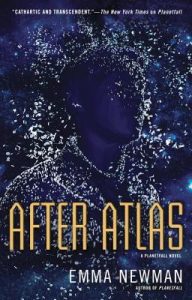 After Atlas is sort of the odd book out in the trilogy, as both Planetfall and Before Mars feature small insular communities, whereas After Atlas shows us what the wider society is like back on Earth.
After Atlas is sort of the odd book out in the trilogy, as both Planetfall and Before Mars feature small insular communities, whereas After Atlas shows us what the wider society is like back on Earth.
It’s true that there are the parallels of the small social community, and the fact that they’re female protagonists. With After Atlas, I do feel there’s a similarity in that as you follow the story you learn more about why Carlos is so angry and so messed up. The thing is it wasn’t a conscious choice to do it that way. With Planetfall I knew that it would be a colony and I decided that a thousand people would be a good idea. I sat down and wrote out various ways that I would do a colony, basically. Because if you can’t be God for your own books what is the point? And then by the time I got to Before Mars, there were elements of the world building that were already in place that informed the decisions about what that colony on Mars was going to be like. It’s one of those odd things when you write a standalone series, when you consider each book in isolation in the pressure cooker of writing that book at the time, it isn’t until much later that you stand back and go, aahhhhh. And sometimes people will say, oh I really like the way you planned such and such, and I’ll be like, yeah I totally didn’t plan that. But your brain just chucks stuff out and then you can make things afterwards.
A lot of the anger in After Atlas is about these massive corporations and the fact that everything is aggressively privatised.
Yep, there is some of my own anger in there. At the event on Monday, someone was talking about how they despair when people have been saying about taking the politics out of sci-fi, in the recent discourse. And of course, what they’re actually saying is all the politics they don’t like out of sci-fi, and they asked, how political is my work? And I said that it’s marinated in it, it is totally inseparable from my politics. It’s not just rage at disempowerment, it’s the rage at the systemic crushing of humanity by the juggernaut of late stage capitalism that we’re in now. The whole thing with After Atlas was based on at the time, and those halcyon days when there was no such thing as Brexit and Trump hadn’t been elected, and the thing I was really worried about was TTIP, and I wish I could be worried about that know, you know? It seems such a simple, innocent time. And so all I did was think, if the TTIP went through, what is the worst case scenario we could end up with? And bam, that is After Atlas.
The neural implants allow you to explore that really intrusive social media technology and who is collecting all that data, and you literally have the thought police from Nineteen Eighty-Four implanted in your head.
Yeah and that’s something that I felt I could explore a lot more with Carlos, because he’s a slave and they can literally monitor his thoughts, and that is like horror. It is kind of a horror story that I wrote there. And also with Ren, her attitude towards the social media is she’s struggling with her mental illness, there are reflections in my struggle with social media, in that there are times when I just think I cannot handle that, and if it was even more embedded in my life then I would find that even more incredibly difficult. And then thinking, well it could be like that. So they’re just different ways to explore concerns that I have now. Because all science fiction is about today. I worry a lot. I’m really good at it. And several of those worries kind of came out in the books.
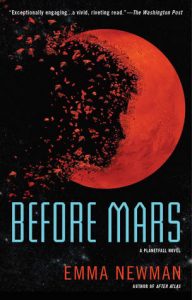 Before Mars features a lot of the geology of Mars. One of the reasons the protagonist is so excited about going to Mars is that she can do all this geological research through the back door whilst she’s there to paint for the rich guy.
Before Mars features a lot of the geology of Mars. One of the reasons the protagonist is so excited about going to Mars is that she can do all this geological research through the back door whilst she’s there to paint for the rich guy.
Yeah, and that’s one of the things I was very depressed by; the thought of this kind of corporate research base where people have to do science by the back door. Especially as day by day, as I was writing it, it was coming true. With the administration in the states starting to delete data and the things like that. This is kind of close to the bone. So yeah, there was a definite, “I am very concerned about this!” And she has arguments with people like, oh great, do I have to justify my desire to do science to another middle manager again.
“Oh, it’s not profitable…”
Yeah, exactly. And it’s that thinking about everything being driven by profit that frustrates me so much. There was a cathartic element there, definitely.
After Atlas was nominated for the Clarke Award last year…
I nearly died! So there was screaming, that I think was probably heard in a fifty mile radius, and I just ran around the house flapping my hands for about ten minutes. It was incredible, and it was one of those things that I had to kind of keep stopping myself and going, is this actually my life? And for a while I wondered if there had been some administrative error, where they had the wrong book out and they made the announcement, and they were like oh no, well we’ve announced it now, we’d better go through with it! I just couldn’t believe it because it’s one of the awards that I followed for a long time and is a big deal to me. It was a really massive thrill and oh my god I was so anxious before the event, I was a mess. I had to phone my dad. About half an hour before the ceremony we got to the bookshop that it was being held in, and I phoned dad up, and I was like, I’m really really nervous! And he was like, “No, just enjoy it, Em! Enjoy it, Em! It’s not going to be the only one!” In his lovely Manchester accent. And he talked me down a bit. But yeah it was great. And my very good friend Adrian Tchaikovsky had won it the year before, and so that was also a nice thing that it was a kind of a connection, something we could share cause he was also there that night as well.
The Split Worlds series is urban fantasy but instead of London or New York, it’s set in an alternate version of Bath. Why Bath?
Well, Bath inspired it. London does come into the later novels, and it’s split between Oxford, Bath and London, and there was a bit of me thinking, well, Bath is awesome, man. It doesn’t have as many books written about it. I adore London for urban fantasy, every time I come to London I have a new idea for another urban fantasy story. It’s so rich and it’s so multilayered and you can’t walk down the street without tripping over a plot point, it’s just the most ridiculous city. But I only live half an hour away from Bath and I’ve been round like the Assembly Rooms with family visiting and things like that. And when I went to those places or looked at a particular vista that was still very Georgian, I felt like I was in that historical space at the same time as the modern world, and that was where the Split Worlds came from, that there are these two worlds coexisting. I kind of wanted to give Bath some attention and some love, but it’s also just a really interesting place. It’s a unique place. And lovely and beautiful. And it was really easy to go there to research stuff. Just down the road.
How is writing an urban fantasy series different from writing speculative fiction?
It’s a lot less scary. I was really scared before writing Planetfall. When I realised that the story that became Planetfall had to be science fiction, I thought, I’m not sure if I can pull this off. I felt the weight of the preceding work. I feel that because science fiction’s a relatively small genre, that even though there are hundreds of sci-fi books, it still feels relatively small and relatively young, and it feels like you’re closer to the dialogue that’s happening within that genre. I was worried that I was going to screw it up, that I was going to get the science wrong, every possible thing. Whereas with urban fantasy, it’s that way because it just is. And the only thing I’d worry about would be if I had a gargoyle on the top of Saint Pancras, whether he could actually see down into this particular street in London, and that is a really nice thing to do. And I did a ton of research for the Split Worlds, all of the world building that went into those books is all based on historical fact, geographical locations. As much as could be true in those books is true. But with Planetfall and After Atlas and Before Mars I felt like I had to be rigorous in a way that I couldn’t be with urban fantasy. There was the pressure of getting the science plausibly correct but also reminding myself that I am not a futurologist, and this is not my job to predict the future and it could still be my version of the future. Once I’d got over that mental hurdle I thought, ok I’m going to have some fun. As long as I know where my starting points are in terms of technology, the way that I extrapolate out to my future, as long as I understand it and I know that every step where I am incorporating some change or introducing a big lie, as long as I know that that is not breaking anything fundamental, that is fine and I will forgive myself. And then I could do it. It’s just a different emphasis.
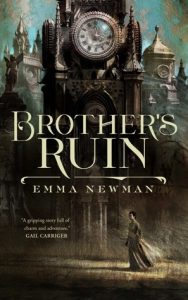 You’ve also written a couple of steampunk novellas for Tor, Brother’s Ruin and Weaver’s Lament…
You’ve also written a couple of steampunk novellas for Tor, Brother’s Ruin and Weaver’s Lament…
Yes. They were a lot of fun. I had this idea about a Victorian England around the 1850s where the shtick behind the world is that the industrial revolution was brought about by advances in magic instead of advances in science. And I was literally walking across my living room and it just kind of dropped into my head and I just stopped and stood there for a minute thinking. Then I completely forgot what I was doing and my family was like, what are you doing and I was like, just had this idea… And then had to go to my history books and was reading all this stuff and going ooh I could replace how they invented cast iron, that could be a different college of magic. That was me being a real nerd and going through various critical developments in the industrial revolution and working out an underlying magical metaphysics that could explain it. So it was just a different flavour of my own obsessive geekery. And it was nice because again it felt more relaxed in a way. When I write science fiction I go to a very deep, different state. And I write it so bloody slowly. I can’t write more than 2000 words a day, or if I can, then the next day, I write less. And the thing that I find with the sci-fi is it’s so much more demanding, and so much more taxing, whereas the urban fantasies, it almost feels like having a holiday.
And yeah, they were just fun. I also wanted to give my readers something fun as well, something that’s light, but not totally candy floss. The second one, Weaver’s Lament, is set in a cotton mill. And all of the conditions are exactly as they were. My paternal side of my family come from Manchester, and I have a real connection to the city, and I felt really passionately about it. A lot of my anger about the way that people had been treated and the conditions of the workers and the things that we’re facing now again came out in those as well. So it was another way to explore my rage. Like I said, I have an abundance of it, there’s enough to go round between all genres.
What’s next for Emma Newman?
Well, I’m writing the fourth novel set in the Planetfall universe. I’m about 50,000 words in, life keeps coming at me, and I’ve had to pause because of audiobooks and this book launching and massive anxiety attacks around this book. But thank god I’m enjoying writing this one. It’s a very different experience to writing Before Mars. I’m really nerdily excited about it. And someone that I’m hoping is going to be here this evening, he’s a naval engineer and he designs submarines and rocket ships for a hobby, so we had this meal together where I told him about the idea I had for the spaceship in this book. We sat down and literally drew on serviettes and he told me about this cool tech and we were just nerding out and it was the best dinner I’ve ever had, and it was great. I think all I’ll say about it is it’s set in space.
Thank you Emma Newman for speaking with us!
Emma Newman is the author of the Planetfall, Split Worlds and Industrial Magic series, all available now.

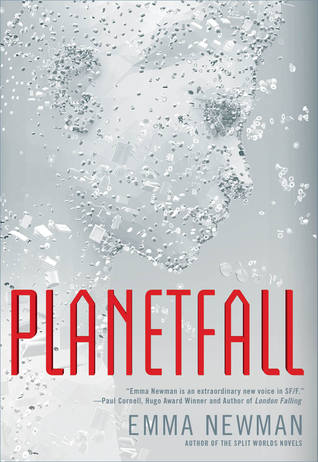
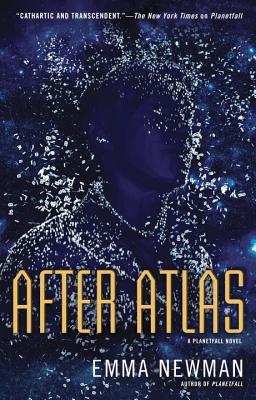
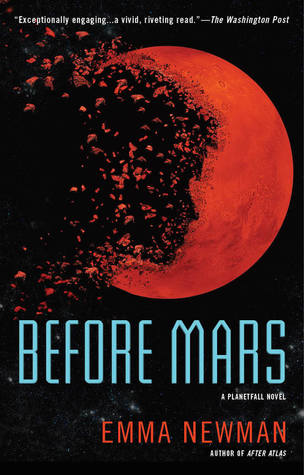
[…] with Emma Newman https://fantasy-hive.co.uk/2018/04/interview-with-emma-newman/ Emma Newman, author of the fabulous Planetfall series, discusses her writing in this riveting […]
Ooo… this is a fabulous interview and very timely as I’ve just read and reviewed Emma Newman’s ‘Before Mars’ – which is one of my outstanding reads of the year, so far. I haven’t caught up with the steampunk books, yet though. Thank you so much!
What a fantastic interview! And now I’m going to hunt down those books and add them to my TBR pile, because they sound wonderful.